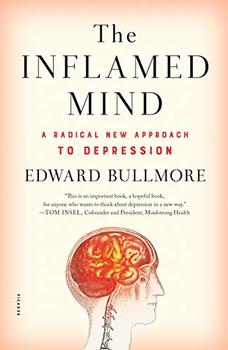Summary | Excerpt | Reviews | Beyond the Book | Readalikes | Genres & Themes | Author Bio

A Radical New Approach to Depression
by Edward Bullmore
Watson and Crick published the architectural principles of deoxyribonucleic acid (DNA) in 1953, opening up entirely new fields of genetic science and molecular biology. This was a critical turning point in the formation of what became the central orthodoxy of biology – the theory that genetic information is coded by the sequence of DNA molecules, and that different sequences of DNA specify how different proteins are assembled by precisely stringing together hundreds of thousands of amino acids. Since proteins are an enormously large and diverse group of molecules in the human body – including antibodies, cytokines, enzymes and many hormones – our deeper understanding of how protein synthesis is genetically controlled by DNA has been widely recognised as one of the most important advances in the history of biology.
About 50 years later, when President Bill Clinton celebrated the sequencing of the human genome at a White House ceremony in January 2000, he spoke with unbounded millennial optimism about the genome: “without a doubt the most important, most wondrous map ever produced by humankind”. He saw this as a scientific advance with the potential to deliver medical breakthroughs on an extraordinary scale and at an extraordinary rate. “It is now conceivable that our children’s children will know the term cancer only as a constellation of stars.” Now, almost 20 years after he spoke those words, Bill Clinton is a grandfather but we are nowhere near consigning the word to common use only in horoscopes. In the British National Health Service (NHS) in 2018, genetics has made a life-or-death difference to some patients with leukaemia or breast cancer, who are lucky enough to have a genetic profile that makes them more likely to respond to new anti-cancer medicines. But it will take many more generations for the therapeutic potential of genetics to play out across the whole spectrum of health services.
So it is reasonable to expect a fairly slow burn for immuno-psychiatry in practice. In the NHS in 2018, immunology has made no difference whatsoever to any patients with depression, psychosis or Alzheimer’s disease. There are no licensed medicines or other treatments for depression that act primarily on the immune system. There are fascinating new insights into how high levels of social stress can increase bodily inflammation. And there is growing evidence that people who have experienced adversity or abuse in childhood are more likely to be inflamed as children and adults. It is also increasingly clear that depressed patients who are also inflamed are less likely to respond well to treatment with conventional anti-depressant drugs.4 But there is as yet no well-known way by which doctors or other mental health practitioners can leverage this new knowledge to help people with depression. And until my GP is in a position to offer an immunological treatment for depression, I wouldn’t expect him to spend too much time entertaining a fancy new immunological way of thinking about where depressive symptoms come from.
Personally, I expect this to change. I can imagine a future in which the old dividing lines between mental and physical illness are redrawn, the 400-year-old habit of dualist diagnosis is kicked, and the immune system becomes much more central to how we think about – and treat – psychological and behavioural symptoms like depression. I can easily imagine that there could be some decisive moves in this direction over the next five years or so. The lesson of history is that medical revolutions do not make good reality TV. But there is a current of scientific change running under the surface of day-to-day medical practice which could transform the way we deal with depression and other mental health disorders. And that is the idea behind this book. We can move on from the old polarised view of depression as all in the mind or all in the brain to see it as rooted also in the body; to see depression instead as a response of the whole organism or human self to the challenges of survival in a hostile world.
Excerpted from The Inflamed Mind by Edward Bullmore. Copyright © 2018 by Edward Bullmore. Excerpted by permission of Picador. All rights reserved. No part of this excerpt may be reproduced or reprinted without permission in writing from the publisher.
Your guide toexceptional books
BookBrowse seeks out and recommends the best in contemporary fiction and nonfiction—books that not only engage and entertain but also deepen our understanding of ourselves and the world around us.